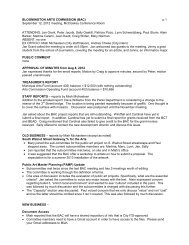Peak Oil Task Force Report - City of Bloomington - State of Indiana
Peak Oil Task Force Report - City of Bloomington - State of Indiana
Peak Oil Task Force Report - City of Bloomington - State of Indiana
You also want an ePaper? Increase the reach of your titles
YUMPU automatically turns print PDFs into web optimized ePapers that Google loves.
FURTHER READING<br />
The following sources provide useful information about peak oil and peak energy and<br />
reveal a diverse range ideas on those topics. The <strong>Task</strong> <strong>Force</strong> does not necessarily endorse<br />
every opinion in every work listed.<br />
BOOKS<br />
BROWN, Lester. Plan B 2.0: Rescuing a Planet Under Stress and a Civilization in<br />
Trouble. W.W. Norton, 2006. Plan B has three components: (1) a restructuring <strong>of</strong> the<br />
global economy so that it can contain civilization; (2) an all‐out effort to eradicate poverty,<br />
stabilize population, and restore hope in order to elicit participation in the developing<br />
countries; and (3) a systematic effort to restore natural systems. http://www.earth‐<br />
policy.org/Books/PB2/index.htm.<br />
CAMPBELL, C.J. The Coming <strong>Oil</strong> Crisis. Multi‐Science Publishing, 2004. An<br />
interdisciplinary treatment <strong>of</strong> how much oil remains to be found and for how long global oil<br />
resources can continue to support the expected growth in demand. Campbell concludes<br />
that given current production rates, peak production will be reached some time in the first<br />
decade <strong>of</strong> the new millennium. Based on this conclusion, Campbell examines three<br />
scenarios and <strong>of</strong>fers some interesting insights into the possible consequences to a world<br />
that has to adjust to a dwindling oil supply.<br />
CATTON, William Robert. Overshoot: the Ecological Basis <strong>of</strong> Revolutionary Change.<br />
University <strong>of</strong> Illinois Press, 1980. Suggests that humanity has already exceeded the long‐<br />
term carrying capacity <strong>of</strong> the earth and is now relying on the “phantom carrying capacity”<br />
<strong>of</strong> non‐renewable resources that will some day disappear.<br />
DEFFEYES, Kenneth. Hubbert’s <strong>Peak</strong>: The Impending World <strong>Oil</strong> Shortage. Revised ed.<br />
Princeton University Press, 2002. Deffeyes employs the methods <strong>of</strong> M. King Hubbert to<br />
conclude that world oil production will peak in this decade.<br />
DEFFEYES, Kenneth. Beyond <strong>Oil</strong>: The View from Hubbert’s <strong>Peak</strong>. Hill and Wang, 2005.<br />
Similar to Deffeyes’ earlier book, Hubbert’s <strong>Peak</strong>, but with updated information. Deffeyes<br />
explains why Hubbert’s theory <strong>of</strong> peak oil obtains and makes a call for public and private<br />
entities to develop urgent mitigation plans.<br />
EBERHART, Mark. Feeding the Fire: The Lost History and Uncertain Future <strong>of</strong><br />
Mankind’s Energy Addiction. Harmony, 2007. Eberhart documents the history <strong>of</strong> energy<br />
and the evolution <strong>of</strong> energy dependence. He demonstrates the imminence <strong>of</strong> the crisis that<br />
looms if we continue current consumption patterns.<br />
<strong>Report</strong> <strong>of</strong> the <strong>Bloomington</strong> <strong>Peak</strong> <strong>Oil</strong> <strong>Task</strong> <strong>Force</strong> 219









